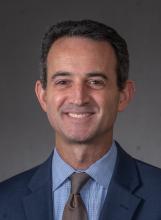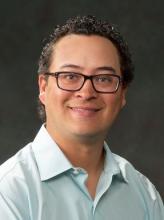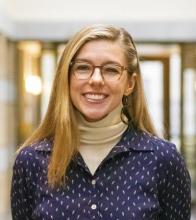People
The research, scholarship and dialogue facilitated by the Center on American Politics is made possible by the dedicated work of our team of professors, research associates and affiliated faculty. Our interdisciplinary team contributes to our mission of understanding American politics, advancing civil discourse, and forming positive policy solutions.
Leadership Team
Seth Masket is a professor of political science and director of the Center on American Politics. His research focuses on political parties, state legislatures, and campaigns and elections. He is the author of Learning from Loss: The Democrats 2016-2020 (Cambridge University Press), The Inevitable Party: Why Attempts to Kill the Party System Fail and How they Weaken Democracy (Oxford University Press), and No Middle Ground: How Informal Party Organizations Control Nominations and Polarize Legislatures (University of Michigan Press). Masket is a contributor to FiveThirtyEight and the Mischiefs of Faction blog. His work has also appeared in the Washington Post, the Los Angeles Times, Politico, and The New York Times.
Sam Kamin joined the faculty at the Sturm College of Law in 1999, and is the Vicente Sederberg Professor of Marijuana Law and Policy. He holds both a J.D. and a Ph.D. from the University of California at Berkeley. Kamin's research interests include criminal procedure, death penalty jurisprudence, federal courts, and constitutional remedies. He is a co-author of Investigative Criminal Procedure: A Contemporary Approach and Cases and Materials on the Death Penalty. He has become one of the nation's leading experts on the regulation of marijuana; in 2012 he was appointed to Governor John Hickenlooper's Task Force to Implement Amendment 64 and the ACLU of California's blue-ribbon panel to study marijuana legalization.
Lisa Martinez is an associate professor in the Department of Sociology and Criminology, and a core faculty member of the DU Latino Center for Community Engagement and Scholarship (DULCCES)--an interdisciplinary program dedicated to conducting research on Latina/o communities in Denver and the Rocky Mountain West. She studies the impact of immigration policies on the social, economic, and political well-being of Latina/o communities as well as educational, health-related, and job market outcomes among Latinas/os and immigrants. She is currently working on an interdisciplinary project with her DULCCES colleagues on the pathways to mobility among Latino and immigrant youth.
Lynn Schofield Clark is a professor and chair in the Department of Media, Film and Journalism Studies, and the director of the Estlow International Center for Journalism and New Media. She is the author of The Parent App: Understanding Families in a Digital Age; From Angels to Aliens, Religion, Media, and the Marketplace; and Media, Home, and Family. She is a blog contributor for Psychology Today. Clark has been a visiting fellow at the Digital Ethnography Research at RMIT, Australia (2014), visiting professor at the University of Copenhagan, Denmark (2014), and was named the 2012 University of Denver Service Learning Faculty of the Year.
Susan Schulten is a professor in the Department of History, and has taught at the University of Denver since 1996. She is the author of Mapping the Nation: history and cartography in nineteenth-century America, and The Geographical Imagination in America, 1880-1950. Schulten earned her doctorate from the University of Pennsylvania. In 2010, she was awarded a Guggenheim Fellowship for her research on maps. In 2013, the Pacific Coast Branch of the American Historical Association awarded Mapping the Nation the Hundley Prize for the most distinguished work of history written by a scholar in the American or Canadian west. Since 2010, Schulten has contributed to the "Disunion" series in The New York Times, which commemorates the sesquicentennial of the American Civil War.
Associated Faculty
Sara Chatfield is an assistant professor in the Department of Political Science. She received her doctorate from the University of California, Berkeley. Her research focuses on the development of married women's economic rights in U.S. state courts, legislatures, and constitutional conventions in the 1800s and early 1900s. She also conducts research on political behavior (including various aspects of political participation and vote choice) and American political development (including congressional politics and analysis of historical polling data).
Dr. Matfess is an assistant professor at the Josef Korbel School of International Studies at the University of Denver, where she is an affiliate of the Sié Chéou-Kang Center for International Security and Diplomacy. She is also a Research Fellow at the Research on International Policy Implementation Lab, a Senior Associate (non-resident) at the Center for Strategic and International Studies' (CSIS) Africa Program, and a Fellow with the George Washington University Program on Extremism. She was a 2020-2021 United States Institute for Peace (USIP) Peace Scholar Fellow.
Dr. Matfess’ research is at the intersection of security, gender, and governance, with a focus on sub-Saharan Africa. Her first book, Women and the War on Boko Haram, was published by Zed Books in 2017.
Nancy Wadsworth is an associate professor in the Department of Political Science. She teaches a variety of courses including Early Modern and Contemporary Political Theory, American Political Thought and Development, Social Movements and Grassroots Activism, American Religious Politics and Indigenous People's Politics, and Political Forgiveness. She received her doctorate degree from The New School for Social Research. Her areas of expertise include American political culture, social movements, politics of race and religion, political theory, and reconciliation and forgiveness processes.
Professor Chen is an assistant professor of Political Science at the University of Denver. His research examines how race, ethnicity, gender, and other social identities affect public opinion and political behavior in the United States. Dr. Chen teaches classes on race and ethnicity, political psychology, public opinion, political behavior, and misinformation/conspiracy theories.
Dr. Chen’s research appears in Political Behavior, American Politics Research, Analyses of Social Issues and Public Policy, Political Research Quarterly, Personality and Individual Differences, Political Studies, the Journal of Elections, Public Opinion, and Parties, the International Journal of Public Opinion Research, the Oxford Research Encyclopedia of Politics, the Journal of Political Marketing, and the Canadian Journal of Political Science.
Professor Sperber is an assistant professor in the Political Science department and specializes in comparative and international politics, with regional expertise in sub-Saharan Africa. Her research is focused on religion and politics in sub-Saharan Africa, with a spotlight on the role of Christianities in Southern and Eastern African politics. Dr. Sperber's work received awards at both Columbia University and Brown University, and, in 2018, she received the American Political Science Association’s Ted Jelen Award for the best article published in religion and politics. She has published in journals such as Political Behavior, Politics and Religion, the Journal for the Scientific Study of Religion, the International Journal of Social Policy, and the American Journal of Public Health, among others.
Joshua Wilson is a professor in the Department of Political Science. His areas of expertise include Law and Society, Social Movements, Abortion Politics, American Constitutional Law and Civil Liberties, Lawyers and the Legal Profession, American Conservative Politics. Wilson's research concerns the varying abilities of political and social movements to use law--broadly defined--in the pursuit of political ends. He has a doctorate in Jurisprudence & Social Policy from the University of California, Berkeley. Portions of his academic work have been published in Law & Society Review, Law & Social Inquiry, and Studies in Law, Politics, & Society, and his research has been discussed in Time Magazine, The Deseret News, The Guardian (UK), Macleans (CAN), and on NPR & PRI.
Affiliated Faculty
Jesse is an Assistant Professor of Political Science at the University of Denver. Jesse’s research focuses on political economy, democratization, and international migration. He is interested in political causes and consequences of emigration in developing countries. Jesse teaches courses on data analysis, research methods, comparative politics, Latin American politics, and political economy.
Jesse’s research supported by the Center on American Politics is titled: Policy Preferences from Two Places: Latinos on Abortion Politics in the United States and the Country of Origin. His proposal will support a project on how Latinos develop policy preferences and political attitudes while absorbing information from the United States and the country of origin.
Jung H. Kwon is an assistant professor of management at the Daniels College of Business and a faculty affiliate for the Center on American Politics during the 2023-24 academic year. His primary research interests include strategic management of intellectual property rights and technology-based entrepreneurship, with particular emphasis on value creation and capture strategies as well as the economics of entrepreneurship. Jung develops theoretical frameworks for organizational and entrepreneurial economics that address societal challenges. His research has been published in Organization Science, the Journal of Management Studies, etc.
Jung's research project, supported by the Center on American Politics at the University of Denver, is entitled "Once Bitten, Twice Shy: Political Scandal and the Reestablishment of Firm Ties to Politicians." In this study on corporate and political ties, first, he will examine when firms establish ties to politicians who have resigned from scandals. Moreover, he will explore whether firms reestablish ties with the same political party, switch party support, or support none of the candidates. Given the upcoming 2024 election and the current nature of the American corporate and political environments, this project would be apposite and opportune.











